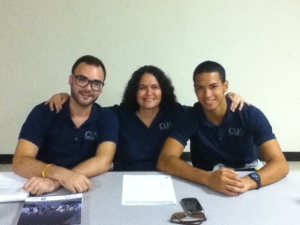By: Sophia Melissa Caraballo
Members of the Centro Universitario para el Acceso of the University of Puerto Rico – Mayagüez, got together on Thursday, October 24, 2013 to discuss the grave problem our island has with the access to higher education. Main investigator of the CUA Dr. Lissette Rolón Collazo, Coordinator Representative Alan López García, and Student Representative Edrick Alvarado Rodríguez were able to answer the various questions presented to them by faculty and students.
The main topic addressed in the press conference was the amount of obstacles presented to the students and implemented by the government and the island’s public system of education to limit access to a college degree. Economic struggle is the main reason why most students from public housing aren’t able to continue their studies, as said by Rolón. The majority of the student population in UPRM consists of students who come from the middle and high social classes. Those who are at a disadvantage are kept out, even though the state universities are meant to be the cheapest.
Edrick Alvarado, a second year theoretical physics student, struggled most of his life with his family’s economy. With the help and motivation of his mother and teachers, he was able to reach his goals. “I’d say that the biggest [obstacle] was the economic issue. When it came to applying to the university, I couldn’t even pay my College Board,” he said.
Coming from a single parent household, where his mother had not obtained her high school diploma, the community around Edrick Alvarado did not want to see him be successful. He recalled that it was against the typical stereotype of a child growing up in public housing. During middle school, he was helped by one of his teachers to reach the required grades he needed so he could move on to the high school of his dreams, the Residential Center of Educative Opportunities of Mayagüez (CROEM for its name in Spanish).
Another tool that was able to help him through the difficulties was the CUA itself. The CUA’s mission is to conduct activities and research to understand the connection between socioeconomic and educational inequalities. It also serves to contribute to the increase of disadvantaged students that are admitted and that graduate successfully from higher education institutions in Puerto Rico, as confirmed by its official website. The CUA works with students, like Edrick, who want to overcome their obstacles to be able to be a better and productive individual in society. Many of these students struggle through their classes but they don’t lack the motivation, therefore with the help that the CUA offers, they are able to succeed in their studies. The CUA offers a range of tutoring sessions that vary from peer tutoring according to classes to those according to their interests. Alan Lopez said that many are also able to experience the college life itself by spending a specific day attending different classes of their interest. The students have the motivation and that neither long days nor difficult classes can take away their desire to become something great.
